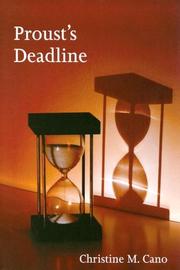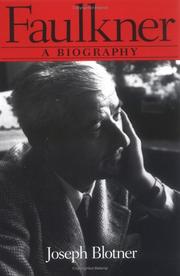| Listing 1 - 10 of 350 | << page >> |
Sort by
|
Book
ISBN: 2346098493 9782346098491 Year: 2016 Publisher: Paris : BnF-P,
Abstract | Keywords | Export | Availability | Bookmark
 Loading...
Loading...Choose an application
- Reference Manager
- EndNote
- RefWorks (Direct export to RefWorks)
Book
ISBN: 1617979759 9781617979750 9789774169533 Year: 2020 Publisher: Cairo New York
Abstract | Keywords | Export | Availability | Bookmark
 Loading...
Loading...Choose an application
- Reference Manager
- EndNote
- RefWorks (Direct export to RefWorks)
Book
ISBN: 161117838X 1611178398 9781611178395 9781611178388 Year: 2018 Publisher: Columbia, SC : Baltimore, Md. : University of South Carolina Press, Project MUSE,
Abstract | Keywords | Export | Availability | Bookmark
 Loading...
Loading...Choose an application
- Reference Manager
- EndNote
- RefWorks (Direct export to RefWorks)
Novelists, American. --- Criticism, interpretation, etc. --- American novelists

ISBN: 1283135620 9786613135629 0252090721 9780252030703 0252030702 9780252090721 9781283135627 6613135623 Year: 2006 Publisher: Urbana : University of Illinois Press,
Abstract | Keywords | Export | Availability | Bookmark
 Loading...
Loading...Choose an application
- Reference Manager
- EndNote
- RefWorks (Direct export to RefWorks)
Book
ISBN: 1573668389 9781573668385 9781573661430 1573661430 Year: 2008 Publisher: Tuscaloosa, Alabama : FC2/University of Alabama Press,
Abstract | Keywords | Export | Availability | Bookmark
 Loading...
Loading...Choose an application
- Reference Manager
- EndNote
- RefWorks (Direct export to RefWorks)
Originally published in 1986, this new edition returns to print a classic, influential work of American fiction. ""My Amputations, Clarence Major's fifth novel, is an explosively rich book about a man pursued by his shadow. Its protagonist is either a desperate ex-con who has become convinced that he is an important American novelist or a desperate American novelist who has become convinced that he-and most of what passes for literary life on three continents-is a con. Clarence Major has split the difference between Ralph Ellison's Invisible Man and Herman Melville's
Americans --- African American novelists --- Afro-American novelists --- Novelists, African American --- Novelists, American
Book
ISBN: 1628460156 1306840511 1628460164 1626740399 1496809688 9781628460162 9781626740396 9781626740945 1626740941 9781628460155 Year: 2014 Publisher: Jackson
Abstract | Keywords | Export | Availability | Bookmark
 Loading...
Loading...Choose an application
- Reference Manager
- EndNote
- RefWorks (Direct export to RefWorks)

ISBN: 1282960881 1429460512 1578067324 1617031100 9786612960888 Year: 2005 Publisher: Jackson : University Press of Mississippi,
Abstract | Keywords | Export | Availability | Bookmark
 Loading...
Loading...Choose an application
- Reference Manager
- EndNote
- RefWorks (Direct export to RefWorks)
William Faulkner (1897-1962) remains the pre- eminent literary chronicler of the American South and a giant of American arts and letters. Creatively obsessed with problems of race, identity, power, politics, and family dynamics, he wrote novels, stories, and lectures that continue to shape our understanding of the region's promises and problems. His experiments and inventions in form and style have influenced generations of writers. Originally published in 1974 as a two-volume edition and extensively updated and condensed in a 1991 reissue, Joseph Blotner's Faulkner: A Biography remains the qu
Book
ISBN: 1785434888 9781785434884 Year: 2015 Publisher: Scribe Publishing
Abstract | Keywords | Export | Availability | Bookmark
 Loading...
Loading...Choose an application
- Reference Manager
- EndNote
- RefWorks (Direct export to RefWorks)
Frances Burney was born on June 13th, 1752 in Lynn Regis (now King's Lynn). By the age of 8 Frances had still not learned the alphabet and couldn't read. She now began a period of self-education, which included devouring the family library and to begin her own 'scribblings', these journal writings would document her life and cover the next 72 years. Her journal writing was accepted but writing novels was frowned upon by her family and friends. Feeling that she had been improper, she burnt her first manuscript, The History of Caroline Evelyn, which she had written in secret. It was only in 1778 with the anonymous publication of Evelina that her talents were available to the wider world. She was now a published and admired author. Despite this success and that of her second novel, Cecilia, in 1785, Frances travelled to the court of King George III and Queen Charlotte and was offered the post of "Keeper of the Robes". Frances hesitated. She had no wish to be separated from her family, nor to anything that would restrict her time in writing. But, unmarried at 34, she felt obliged to accept and thought that improved social status and income might allow her greater freedom to write. The years at Court were fruitful but took a toll on her health, writing and relationships and in 1790 she prevailed upon her father to request her release from service. He was successful. The ideals of the French Revolution had brought support from many English literates for the ideals of equality and social justice. Frances quickly became attached to General Alexandre D'Arblay, an artillery officer who had fled to England. In spite of the objections of her father they were married on July 28th, 1793. On December 18th, 1794, Frances gave birth to their only child, a son, Alexander. Frances's third novel, Camilla, in 1796 earned her 2000 and was enough for them to build a house in Westhumble; Camilla Cottage. In 1801 D'Arblay was offered service with the government of Napoleon in France, and in 1802 Frances and her son followed him to Paris, where they expected to remain for a year. The outbreak of the war between France and England meant their stay extended for ten years. In August 1810 Frances developed breast cancer and underwent a mastectomy performed by "7 men in black". Frances was later able to write about the operation in detail, being conscious through most of it, anesthetics not yet being in use. With the death of D'Arblay, in 1818, of cancer, Frances moved to London to be near her son. Tragically he died in 1837. Frances, in her last years, was by now retired but entertained many visits from younger members of the Burney family, who gathered to listen to her fascinating accounts and her talents for imitating the people she described. Frances Burney died on January 6th, 1840.
Women. --- Novelists, English. --- Travel.
Book
ISBN: 1785434896 9781785434891 Year: 2015 Publisher: Scribe Publishing
Abstract | Keywords | Export | Availability | Bookmark
 Loading...
Loading...Choose an application
- Reference Manager
- EndNote
- RefWorks (Direct export to RefWorks)
Frances Burney was born on June 13th, 1752 in Lynn Regis (now King's Lynn). By the age of 8 Frances had still not learned the alphabet and couldn't read. She now began a period of self-education, which included devouring the family library and to begin her own 'scribblings', these journal writings would document her life and cover the next 72 years. Her journal writing was accepted but writing novels was frowned upon by her family and friends. Feeling that she had been improper, she burnt her first manuscript, The History of Caroline Evelyn, which she had written in secret. It was only in 1778 with the anonymous publication of Evelina that her talents were available to the wider world. She was now a published and admired author. Despite this success and that of her second novel, Cecilia, in 1785, Frances travelled to the court of King George III and Queen Charlotte and was offered the post of "Keeper of the Robes". Frances hesitated. She had no wish to be separated from her family, nor to anything that would restrict her time in writing. But, unmarried at 34, she felt obliged to accept and thought that improved social status and income might allow her greater freedom to write. The years at Court were fruitful but took a toll on her health, writing and relationships and in 1790 she prevailed upon her father to request her release from service. He was successful. The ideals of the French Revolution had brought support from many English literates for the ideals of equality and social justice. Frances quickly became attached to General Alexandre D'Arblay, an artillery officer who had fled to England. In spite of the objections of her father they were married on July 28th, 1793. On December 18th, 1794, Frances gave birth to their only child, a son, Alexander. Frances's third novel, Camilla, in 1796 earned her 2000 and was enough for them to build a house in Westhumble; Camilla Cottage. In 1801 D'Arblay was offered service with the government of Napoleon in France, and in 1802 Frances and her son followed him to Paris, where they expected to remain for a year. The outbreak of the war between France and England meant their stay extended for ten years. In August 1810 Frances developed breast cancer and underwent a mastectomy performed by "7 men in black". Frances was later able to write about the operation in detail, being conscious through most of it, anesthetics not yet being in use. With the death of D'Arblay, in 1818, of cancer, Frances moved to London to be near her son. Tragically he died in 1837. Frances, in her last years, was by now retired but entertained many visits from younger members of the Burney family, who gathered to listen to her fascinating accounts and her talents for imitating the people she described. Frances Burney died on January 6th, 1840.
Women. --- Novelists, English. --- Travel.
Book
ISBN: 0300232837 9780300232837 9780300232219 0300232217 Year: 2017 Publisher: New Haven
Abstract | Keywords | Export | Availability | Bookmark
 Loading...
Loading...Choose an application
- Reference Manager
- EndNote
- RefWorks (Direct export to RefWorks)
Every devoted reader feels that, in some way, they know Jane Austen. But how can we make sense of her extraordinary achievements? At a time when most women received so little formal education and none could obtain a place at university, how did Austen come to write novels that have commanded the attention of some of the most brilliant minds ever since? Why were hers the books that Darwin knew by heart and Churchill read during the Blitz? In this graceful introduction to the author’s life and works, Fiona Stafford offers a fresh and accessible perspective, discussing Austen’s six astonishing novels in the context of their time. Newly updated, Jane Austen: A Brief Life offers a rich and sympathetic insight into a writer who was just as much the Romantic genius as Keats, Shelley or Byron – full of youthful exuberance, intensely creative once she had found her individual voice, and dead before she reached middle age.
| Listing 1 - 10 of 350 | << page >> |
Sort by
|

 Search
Search Feedback
Feedback About
About Help
Help News
News